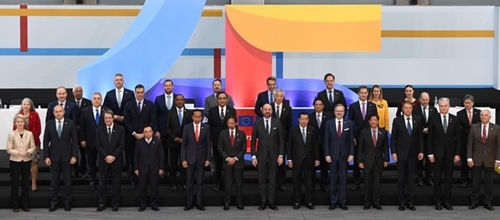The Partnership will help Vietnam deliver on its ambitious goal of net-zero emissions by 2050, accelerate the peak of its greenhouse gas emissions, and transition away from fossil fuels to clean energy. An initial USD 15.5 billion of public and private finance will be mobilized over the next three to five years to support the country’s green transition.
The JETP will help Vietnam work towards a number of ambitious new targets, such as bringing forward the projected peak of all greenhouse gas emissions from 2035 to 2030; reducing peak annual power sector emissions by up to 30 per cent, from 240 megatons to 170 megatons and bringing forward the peak date by five years to 2030; limiting Vietnam’s peak coal capacity to 30.2 GW, down from the current planning of 37 GW; and accelerating the adoption of renewables so that renewable energy accounts for at least 47 per cent of electricity generation by 2030, up from the currently planned 36 per cent.
    |
 |
|
Leaders of ASEAN and E.U. in an event |
The successful delivery of these ambitious targets will result in around 500 megatons (0.5 billion tons) of emissions saved by 2035.
Initial contributions to the Vietnam JETP include USD 7.75 billion in pledges from the IPG together with the Asian Development Bank and the International Finance Corporation. This is supported by a commitment to work to mobilize and facilitate a matching USD 7.75 billion in private investment from an initial set of private financial institutions coordinated by the Glasgow Financial Alliance for Net Zero (GFANZ).
Over the next 12 months, Vietnam will work with the support of partner countries to develop and adopt the Vietnam JETP Resource Mobilization Plan, which will enable the implementation of JETP funding and strategy.
Vietnam is the third country to establish a JETP, following the successful launch of the South Africa JETP at COP26 and the Indonesia JETP at this year’s G20 Leaders’ summit. As a rapidly-growing economy, Vietnam’s JETP will demonstrate that economic growth can be decoupled from fossil fuel energy consumption.
“Vietnam is a dynamic, emerging economy at the heart of Southeast Asia,” said U.K. Prime Minister Rishi Sunak. “The investment we are making today means the country can cut its emissions while simultaneously creating new jobs and growth. Together, we will deliver a cleaner, greener future for Vietnam and our planet.”
“With this JETP Vietnam and its international partners co-led by the E.U. and the U.K. aim to show that fast-growing emerging economies can successfully accomplish the clean energy transition. Boosting renewable energies will also enhance Vietnam’s energy security and autonomy. By 2030, the JETP has the potential to avoid annual emissions equaling the combined total emissions of six E.U. Member States expected for that year. The JETP will help equip Vietnam with a 21st century power sector, energizing its economic modernization. We are very happy to be part of this path-breaking Partnership” said President of the European Commission, Ursula von der Leyen.
French President Emmanuel Macron said, “France and the E.U. are pursuing their strong commitment to climate change mitigation by supporting the acceleration of a just energy transition in Vietnam. France’s contribution, which is part of a long-standing bilateral cooperation, will support energy planning, capacity building and grid development, in parallel with the development of renewable energy. Our collective contribution must support Vietnam’s commitment to a sustainable development trajectory, phasing out coal, in order to limit global warming to 1.5°C.”
Meanwhile, German Chancellor Olaf Scholz said that the JETP with Vietnam will support ambitious climate targets and a substantial increase of renewable energies by 2030 as a joint effort to keep 1.5 °C in reach. The Partnership is about working hand in hand with Vietnam to make sure that the necessary transition will be just and inclusive. He promised that Germany will actively support Vietnam in achieving the newly set goals.
Japan’s Prime Minister Fumio Kishida Fumio said that Japan has been supporting Vietnam’s decarbonization through renewable energy-related projects and welcomes Vietnam‘s ambition to further accelerate just energy transition towards net zero by 2050. Japan is proud to be a member of the Just Energy Transition Partnership, which will promote support for low emission and climate resilient development in Vietnam, in coordination with partner countries, and with further private sector engagement.
“Norway is proud to be part of the Just Energy Transition Partnership and support Vietnam’s effort to speed up the energy transition. We believe this can mobilize much needed private capital to accelerate the ambitious transition from coal to renewable energy,” said Norway’s Prime Minister Jonas Gahr Støre.
For his part, President of the United States, Joe Biden said, “Today, Vietnam is charting an ambitious clean energy future that will deliver on energy security and autonomy by committing to the Just Energy Transition Partnership. The United States is excited to be Vietnam’s partner in green energy, through USAID we have already committed over $50 million invested over five years. Vietnam’s historic commitment to increase renewable energy while reducing coal and emissions catalyzes investment, boosts economic growth, and creates opportunities for the Vietnamese people, while advancing the fight against the global climate crisis. Together we will achieve net zero emissions by 2050!”
U.N. Secretary-General António Guterres said: “With today’s agreement, Vietnam is pioneering a new framework of collaboration to deliver a fair, inclusive energy transition towards renewables. These Partnerships are a crucial tool to unlock the emissions cuts our world needs in the 2020s.”
He added, “We need all hands on deck to realize an energy transition that is global, sustainable, just, inclusive and equitable. The United Nations stands ready to continue supporting these Partnerships and all other cooperative efforts.”
Reported by Chung Anh